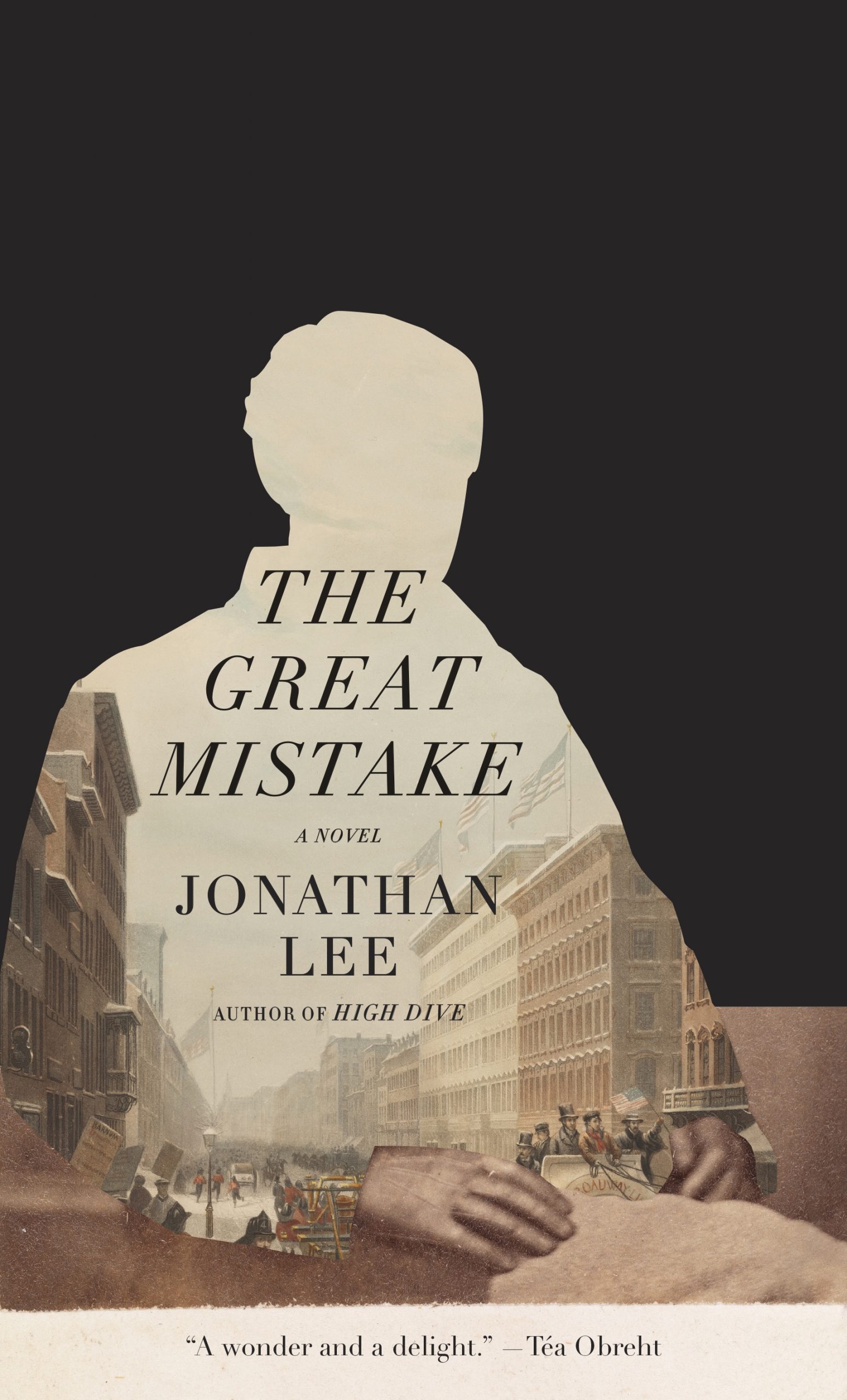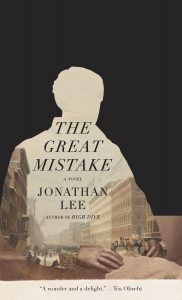By JONATHAN LEE
Excerpted from THE GREAT MISTAKE ©2021 by Jonathan Lee, published by Alfred A. Knopf. (Pre-order here)
One night, out walking, unable to sleep, and more fatigued than usual by his endlessly unfolding apprenticeship, the eighteen-hour days, the bugs that puncture his skin every night, the lack of money for real milk or for visiting his favorite sister, Andrew saw a man in the street who was raising a gun and pointing it at what?
A young mastiff, thin and weary-looking, staggering for a place to sleep.
It was the summer of shooting dogs. The mayor, deciding there were too many strays on the street, had offered an inducement to exertion of fifty cents per death. This generous sum had encouraged certain enterprising New Yorkers to import dogs into the city in the dark of night from Flushing and Oyster Bay, from Crane Neck and Mount Misery, from Saugatuck and Sachem’s Head, all along the shores of Long Island Sound, in order to kill them and drag their bodies to the central payout points.
In a few months, the Great Fire—how keen some men are, he thought, to call destructive things great—would sweep through this street and bring it all to ash. But for now, Andrew’s eyes adjusted to the dark only enough to see what was directly in front of him.
The dog, too, now saw the gunman. Yet it did not run away, was too tired or dumb. The difference, in the end, between life and death is perhaps nothing more than movement? Life on the farm had taught him this, even if he did not quite know how to express such a truth, and Andrew decided to move on the dog’s behalf. He said to the gunman, Wait!
He did not want another harmless dog to die just so the hunter could claim fifty cents from the city. And the man with the gun—this was the strange thing—did exactly as he was told.
Andrew’s fingers began fumbling for coins. He seized, among all the gullyfluff that gathers in a good apprentice’s pocket, fifty suitable cents. This was money which he was otherwise going to spend on bread to fill his roaring stomach, sink himself into a deeper than usual sleep.
He offered the coins to the man, who laughed, and took the money. What a boy! he said. Then he apologized and shot the dog anyway.
Profit and loss. Andrew went hungry for two days on account of this stupid expenditure. New York lessons are quick-learned. An instinct is a propensity prior to experience. Only the dog in a wild state howls for no reason. He watched it being dragged away.
*
He started to think, after this dog event, that the trick to living here was to find a form of distance from the city itself. To see it only as a place, not a life. An area that could change and be changed in the mind, transformed through private unspoken effort. Pick your way through the alleys like a dog in a dream. Do it as poisonous steam rises into an indifferent sky. Inside his head, his own version of the city began to grow.
The sophisticated citizens his father had told him so much about back home threw their waste out of windows each morning. It splashed and spread into puddles which bubbled as the sun sought to reach its peak. Heaps of garbage decomposed in doorways. Rats danced in the alleys. He watched laborers returning home with dinner-kettles. Rag-pickers bothering apple-ladies. Horses set to collapse under the products of commerce they had carried back and forth, back and forth, all day long. New York didn’t set out to charm you. It was like God that way. You had to bring a lot of the enthusiasm yourself. He liked the idea of that. Of being somewhere that would not pander to him, but which would not single him out for any special cruelty either. Any harm would be randomly applied.
Or at least, randomly applied within a given area of social standing. The rich could afford to avoid a good deal of cruelty. They could choose where to put their feet, and what to eat. The constant hunger in Andrew sometimes dwindled to a manageable pit of pain in his gut as he waited each night for Mrs. Hinsdale to bring him a small supper—two potatoes and a strip of boiled shad, six days a week. On Sundays, the potatoes numbered three. And on Sundays, too, the Hinsdales allowed him some time to walk and worship God.
Andrew believed in walking more firmly than he believed in a higher being. Was even more hungry for motion here than he had been at home. So he walked to the Presbyterian churches and the Episcopalian churches, to the Baptist churches and the Methodist churches, to the Wesleyan and Independent churches, to the Dutch Reformed and the Roman Catholic churches, to the Universalist and Orthodox and Quaker churches, to the Hicksite and Congregationalist and Unitarian churches, to the Lutheran and Moravian and Swedenborgian churches, and, on one swiftly regretted occasion, even the German Reformed. A sermon was much cheaper than the theatre. It was also a lesson in the way city gentlemen moved. Their phrases, gestures. An opportunity to watch and imitate, which had to be the first stage of possession? In the rearmost pews his lips moved in mimicry. Performance. And sometimes desire. He loved the energy of the hymns, the sense of belonging they seemed to offer. He memorized words in foreign languages, faithful only to their sounds, and wondered if his own occasional doubts about the existence of God might in some way be mutual. Did anyone in the heavens really believe in him, Andrew Green, this awkward boy below, his spirit, his potential for good? His own question frightened him into muteness, the kind of silence the living rarely know, the moon hanging sullied by smoke in the sky, filthy with the expulsions of men.
Tonight, if his legs had any strength left, he would climb up onto the roof of the store again and watch all the action that Broadway occasioned, the chaos of carts and animals, the hawkers and homeless, the worse off and the better off, the luckier than him and the far less lucky, ladies in their interminable coats braving the dirt simply to be seen. The rich leapt over suspicious puddles in their beautiful clothes. Up and down they strolled, no discernible destination in mind, and that, he decided, must be a thing that money can buy: the freedom from needing direction.
Half-built houses. Whale-oil illumination. An alleyway is a disappointed road, waiting for someone to widen it. He made sketches of the surrounding streets. He was not yet quite sure why.
Even at night there was the sound of breaking stone. It aggravated him, and yet it also stirred an excitement. New buildings gleamed like lines in the Bible, poetic, lovely, as true as fact or fiction. Stony-faced fashionables seeking dinner marched from Union Square to Howard Street and back, their stirring silks, their varnished boots, their Paris bonnets. The rattle of omnibuses, the smell of waste, the constant filth kicked up at crossings, the cigar smoke on the balconies of the cafés overhead, too much detail to see at once, too much to note down, impressions fighting for space in his lists and diaries and letters. He was always writing now. Reading was more problematic. He needed somewhere to obtain actual books. He needed knowledge. He needed, desperately, to escape the smallness of the store.
And standing up high on the roof of Hinsdale & Atkins on those thick summer nights, long before he suspected he might one day become accidentally famous, he looked north across the city as the day declined. Enjoyed a giddy, godly sense of a cooling breeze. The sky up beyond Houston Street became a purer black, a thing one ought to be able to touch or feel, like a piece of coal or a length of slate, a field on Green Hill after burning. It signaled the wilderness this island would still accommodate for a while: the swill-milk, hog-feeding, and bone-boiling establishments; the rocks and swamps and ponds and rills; the dogs and pigs that thrilled their way through the vast northern reaches of New York.
Jonathan Lee is the author of three novels, most recently High Dive, which was a best book of the year in publications including The New York Times, The Guardian, The Wall Street Journal, The Washington Post, and the San Francisco Chronicle. He lives in New York.





